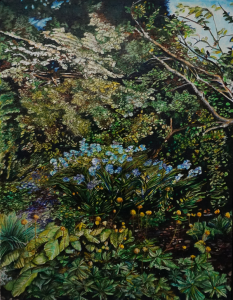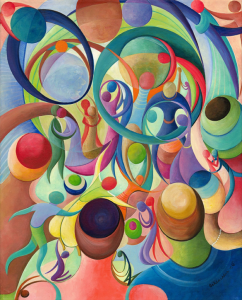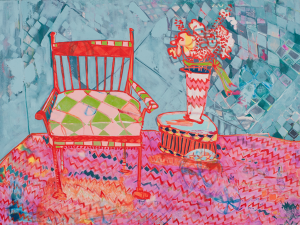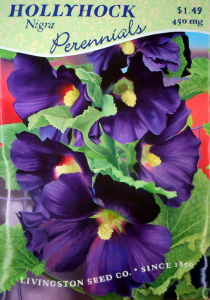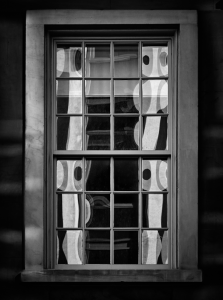Interview Introduction:
 The astonishing literary life of multi-genre writer Molly Peacock proves that creativity can do better than survive the meager soil of its birth: It can go on to flourish, restless and varied, finding and, when necessary, generating its own nourishment, even amid the noise and violence of contemporary life. Peacock’s new poetry collection, The Analyst, her seventh, just published by W.W. Norton, explores her 40-year long relationship with her psychoanalyst, one that began when Peacock, in her early 20s, fearful and floundering, arrived in New York City to begin her career as a writer and teacher. Her analyst’s stroke at 77, and the analyst’s subsequent loss of memory and language, but her pivot toward painting as a means of self-expression, triggered Peacock’s collection. With exquisite lyricism, stunning imagery, and sly wit – the hallmarks of Peacock’s oeuvre – The Analyst offers a luminous meditation on their rare and ever-evolving relationship.
The astonishing literary life of multi-genre writer Molly Peacock proves that creativity can do better than survive the meager soil of its birth: It can go on to flourish, restless and varied, finding and, when necessary, generating its own nourishment, even amid the noise and violence of contemporary life. Peacock’s new poetry collection, The Analyst, her seventh, just published by W.W. Norton, explores her 40-year long relationship with her psychoanalyst, one that began when Peacock, in her early 20s, fearful and floundering, arrived in New York City to begin her career as a writer and teacher. Her analyst’s stroke at 77, and the analyst’s subsequent loss of memory and language, but her pivot toward painting as a means of self-expression, triggered Peacock’s collection. With exquisite lyricism, stunning imagery, and sly wit – the hallmarks of Peacock’s oeuvre – The Analyst offers a luminous meditation on their rare and ever-evolving relationship.
Among other accolades, Oprah Magazine has just chosen The Analyst as a ‘must read’ book for 2017, noting its ‘bittersweet pleasures’ and the way that Peacock, in its 100 pages, brings readers “into the consulting room with her— first supine on the couch, then free to sit up and face the analyst, not as a patient but as one person to another.”
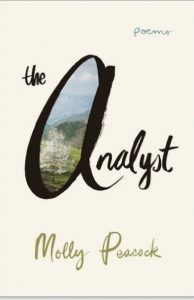 The Analyst is Peacock’s 11th book, but demanding attention too are the deep resonant pleasures of her memoir, Paradise Piece by Piece, first published in 1998, and perhaps more relevant today. (Available now as an eBook.) Peacock describes it as a memoir of her decision to remain childless, but I (having read it many times and taught it in graduate classes on the memoir) see it as a gutsy portrait of the artist as a young woman, in the crazy swirl of ‘60s and ‘70s, finding her way out of a dysfunctional (and at time violent) working class family and into international recognition as a woman of letters. It is also, by the way, a delicious recounting of her love story with her husband Michael Groden, a James Joyce scholar and author, (Ulysses in Focus; Ulysses in Progress) now a distinguished professor emeritus at Western University in London, Ontario. They’d first connected in junior high, but did not see each other for decades, not until after Peacock’s own first successes and Groden’s emigration to Canada.
The Analyst is Peacock’s 11th book, but demanding attention too are the deep resonant pleasures of her memoir, Paradise Piece by Piece, first published in 1998, and perhaps more relevant today. (Available now as an eBook.) Peacock describes it as a memoir of her decision to remain childless, but I (having read it many times and taught it in graduate classes on the memoir) see it as a gutsy portrait of the artist as a young woman, in the crazy swirl of ‘60s and ‘70s, finding her way out of a dysfunctional (and at time violent) working class family and into international recognition as a woman of letters. It is also, by the way, a delicious recounting of her love story with her husband Michael Groden, a James Joyce scholar and author, (Ulysses in Focus; Ulysses in Progress) now a distinguished professor emeritus at Western University in London, Ontario. They’d first connected in junior high, but did not see each other for decades, not until after Peacock’s own first successes and Groden’s emigration to Canada.
Peacock, who has edited The Best Canadian Poets in English Series since 2008, recently published two other books of prose, notable not just for the originality of their contents, but also for the beauty of the books themselves:
The Paper Garden: An Artist Begins her Life’s Work at 72 (Bloomsbury 2012) recounts how Mary Delany, back in 1772, hurled herself out of grief over her second husband’s death, by creating a new art form: mixed-media collage. Over the next decade, Mrs. Delany produced 985 botanically correct, breathtaking cut-paper flowers that are now housed in the British Museum. The book contains thirty-five full-color illustrations of them. A New York Times book review said Delany’s story ‘abounds with energy as Peacock brings her alive. Like her glorious multilayered collages, Delany is so vivid a character she almost jumps from the page.’
The other is Alphabetique: 26 Characteristic Fictions (McClelland and Stewart, 2014) in which Peacock writes flash fictions for the letters of the alphabet, creating personas, provocative and droll, for each. These magical stories are accompanied by stunningly vivid collages by the artist Kara Kosaka, with whom she collaborated on the book, so that words and images have a lovely, fairy-tale like synergy. Upon publication, Amazon called it ‘the most gorgeous gift book of the season.’
Interview:
Recently, after a launch for The Analyst at the Pennsylvania Academy of Fine Arts, Peacock, who will serve as Poet Laureate at the West Chester Poetry Conference in West Chester, June 8-10, generously agreed to an in-depth electronic interview.
Your career has been long and varied as poet, memoirist, performance artist, editor, teacher and advocate for the importance of literature in daily life. What has surprised you most about your own career?
What has surprised me most is the variety itself. In my twenties, I only wanted to write poetry. But as I went on in life—could you say, as I grew up?—and lived both in Canada and in the United States, I discovered that I had a much more restless imagination.
Having created a particular and lovely niche for yourself in American letters, I’m wondering if you started out with a goal or a grand scheme of how you wanted your writing life to turn out. Are you surprised by where you’ve ended up?
There’s that word “surprise” again! Yes, I had a grand scheme at age 30: five or six books of poetry, and maybe a book or two of short stories. That seemed like a lifetime of writing to me, a working class girl with a full time job. But the creation of a life is very much like the creation of a poem. You turn within your limits, and you discover connections you never thought were there.
How about a botanical explanation? Plants have dormant nodes on their stems, and that allows them to respond to changes in environment. Change or damage to one part? Then another part starts to grow. And I think that’s what happened to me.
Each time my creativity began to shift, I panicked. Each shift threw me back into psychotherapy. Was I destroying myself as a poet when I began to write prose? Wrecking my career when I moved to Canada? Abandoning my writing when I performed in The Shimmering Verge, a one-woman show? Bewildering my audience when I started writing about late-life creativity in The Paper Garden. Now, at my age, almost 70, I see how they are all part of the same tapestry. The examined life helps create the artist’s life.
Can you pinpoint a couple of pivotal moments that moved you in your writing from one place to another? (i.e. maybe the move to Canada? Your marriage?) And tell us why you think it happened?
My binational life definitely inspired my memoir. To marry, at 45, my very first serious boyfriend from high school, then to move to another country, Canada, where he had emigrated, suddenly gave me a kind of quiet time. In my husband’s house in London, Ontario, I began to teach myself how to write prose. My marriage forced the issue of children. But I had chosen not to have children, even to the point of having a tubal ligation. With the time to write, and the reason to write (since my then-new husband agreed with my choice) led me to the memoir.
In Canada, many authors write both poetry and prose. We have lots of models for viewing ourselves in a more protean way.
After years of being married to Michael, and observing him as he tracked down scholarly clues—something of no interest to that 30 year-old young woman who only wanted to write poetry—I decided that facts and metaphor could comfortably live side by side. This led me to dare to write biography. Having a world-class researcher available for 24/7 queries (and soothing my daily nervous breakdowns in frustration at the world of information) also helped!
Your memoir, Paradise, Piece by Piece, tells the story of a young woman transcending her highly dysfunctional family to become, at an early age, its sole survivor. How did the writing of this book impact the other parts of your writing life?
What amazes me is that Paradise, Piece by Piece is still so meaningful to readers. My memoir made me realize that my so-called chosen life was the result of social forces. As a younger writer, I wrote about my own life. Understanding that my life had a shape led me to a deep interest in the shapes of the lives of others. This propelled me toward biography. I have to mention my Fellowship from the Leon Levy Center for Biography at the CUNY Graduate Center in New York. That year to write and learn was a life-changer for me, and, posthumously, for Mrs. Delany, the amazing woman who invented collage at the age of 72 in 1772.
The Analyst seems to me to be a return to your work as a more traditional poet after the successes of Alphabetique and The Paper Garden. How long were you working on it? When did you conceptualize it?
My long-time therapist had a stroke in 2012 and closed her practice. Though I had finished our time of analysis, we had check-in appointments for decades and were very close. When I thought she would die, and that I would never see her again, I was catapulted into a strange grief-with-gratitude state. Poems poured out of me. But she survived! Her memory was blasted, though, and she reached out to a me that had existed years before, in the recesses of her long-term memory. We began a new post-therapy relationship. I then had the privilege of watching the person who helped me claim my life as a writer reclaim her own life—through painting. She cannot read. She had to relearn what a key was, to relearn how to lock a door! But those nodes of growth I was talking about worked for her. Her girlhood talent for painting has rescued her. The minute she got out of the hospital she began to draw. And draw away from her previous life. And draw herself into her coda. I wrote the poems obsessively from 2012 to 2015. And then, as it became clear that I had to return to my life, and that she had made a small, peculiar, but vital life for herself with a lot of professional and family help, I stopped, and realized I had a book.
In general, how does a poem, or any other new work, begin for you? Can you describe, briefly, your writing process?
I am writing all the time, either in my head, or on paper. New ideas burgeon, and they are kind of in the back of my mind. I am relaxed about this. I know new ideas will come. It’s one of the pleasures of a long life of writing.
What success has been most meaningful to you?
My greatest successes are my relationships. I have a remarkable forty-two-year friendship with the poet Phillis Levin (Mr. Memory and Other Poems; May Day). We have seen every poem the other has written over all this time. My relationship with my husband began when we were thirteen years old. We are able to keep great solitudes in our marriage, solitudes that hold our creativity apart, yet hold our personalities together. My relationship with my former analyst began when I was 26 and continues, despite her stroke and move across the country, to this day. I can barely define it, even though I wrote a whole book of poems about it. These relationships feel like art to me. In each one we are, together, writing the book of two strangers becoming more and more familiar. Yes, I am thrilled by each writing success as it happens. And probably the New York Times Book Review of my second book of poetry, Raw Heaven, is the most significant success. That landed me on the map of contemporary American letters, and from then I have had a place. But my ever-changing relationships, with growth rings for their years of development, are like great trees in my life.
How do you juggle (balance) your dual citizenship? Has Canada given you something that the United States did not?
I speak here as a dual citizen: Canada supports me in a way unknown to American writers. There are many different sorts of grants, for one thing, but, vaster, Canada is a deeply literate country. School teachers are paid as well as professors. It does not cost a fortune for a great university education. The CBC, where people still speak in paragraphs, is a national government-run enterprise, lifting the level of discourse daily. Every day in The Globe and Mail there is a personal essay by a Canadian citizen. On the subway you might see poor people, but you do not see people in need of health care. It is a nation that, whatever its problems, subscribes to the notion that we must take care of one another. My husband, a nine-time cancer survivor, is alive because of the Canadian health care system. I am in awe of my good fortune in Canada.
And yet…
I am equally an American. It is the place I was born, and New York City, the place where I came of age as a writer, still draws and excites me. There is a self-starter mentality that I love—it helped propel me through my life. I always get new ideas the minute the plane lands. My mother the small businesswoman, my grandfather the general store owner—their bootstrap stories are a deep part of my history, as well as the working class alcoholism and drug addiction that plagued my father and sister. Each year my husband and I teach at the 92St Y Unterberg Poetry Center in February and March, and we are always thrilled to be back among our friends in New York. It’s an almost cellular response.
I vote in both countries and I work hard to support my candidates. I exist both in a flexible parliamentary system, and with the strange inflexibility of the electoral college. I would say that the United States is the country of my youth. But Canada is the country of my age—and, perhaps, my wisdom.
Advice for young writers?
Yes, you have the time to write. Yes, you can write with a full time job, sick parents, a puking dog and children with head lice. I dare you to write fourteen lines of poetry or prose in 45 minutes. Just about everyone has 45 minutes in a day: 15 minutes in the morning and 30 minutes at lunch. Women! Keep your writing in your purse. Don’t reach for that brochure in your dentist’s office waiting room: read your favorite writer—you. Get out those drafts from your bag and revel in your own ideas. That will get you to the next line, the next sentence.
What can we expect next from Molly Peacock?
I’m working on The Flower Diary, a biography of an amazing floral still life painter, Mary Hiester Reid, born in Reading, PA. She attended the Pennsylvania Academy of Fine Arts, met and married a Canadian painter, ran away to Europe with him, then returned to his home in Toronto to make a career. A married artist! And binational…. Do I hear an echo?
From The Analyst by Molly Peacock, published by W.W. Norton and Company
THE ANALYST DRAWS
Two days after your stroke, they hold out the crayon
you vigorously reject. Four days on
without language,
you do what you loved before language:
pick up a pencil and draw.
“Do you know how much raw
rejection you take?” you asked me
one of the times we thought we’d ended therapy,
then said your Radcliffe professor taught
your studio class: all drawing is thought.
But to you, abstraction was lying.
All you did was draw your father failing,
then dying. So when that man stalked to your easel
to deliver his raking critique, you walked
away from the studio—not to touch
a brush for 30 years. Brushes
you exchanged for words,
drawing from what you heard,
the lines of your patients’ inner lives, teasing
out patterns for the easing
of the raking, no, aching you saw.
So draw,
as I was drawn to you
as you drew me to you,
till I could walk away
as you now draw away.
